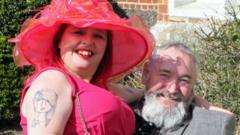The huge sack of Yorkshire tea stands in contrast to the coffee printer, which takes photos of the drinker and prints it on the top with edible ink, but both are equally important in England’s Terrigal training base. It is all part of the goal of building a home away from home in Australia for the Lionesses’ World Cup journey, a process that has been years in the making.
“We’re here in Australia, but what you want to create is that home away from home. When you walk in here it feels immediately like England, like Lionesses, like us,” says the team’s general manager Anja Van Ginhoven, who travelled to Australia for the first of five site visits in December 2021 with women’s technical director Kay Cossington.
The Football Association has flung open the doors of an England training base to the media for the first time, keen to show off the environment that they hope will put players in the best headspace as they bid to go from European champions to world champions.
A giant England flag made of balloons welcomes the 23-strong team and 30 support staff at their private entrance to the hotel, before they ascend up the heavily branded “stairway to heaven” jokes Van Ginhoven, into England’s private section of the Crowne Plaza, a stone’s throw from the beach. One of the first things to greet them is a huge painting by Bolton-based illustrator Harry Ward, bringing together childhood images of each player in the kits of some of their first teams into a unique team photo.
“The significance of this painting is it’s everything that we’ve been trying to do for many months and years, connect us back to our history,” says Cossington. “It’s about connecting the players back to their grassroots clubs and honouring how important grassroots football is to the journeys of our professional players. We all fell in love with this painting when we first saw it.”
Legacy matters. So much so that the cost of the elite level gym the FA has equipped at the Central Coast Stadium, the home of the Central Coast Mariners where the Lionesses are training during the tournament, was split 50/50 between the FA and club and will be donated when they leave. The Mariners, who welcomed approximately 2,500 fans, predominantly school children, to England’s open training on Tuesday, will launch a women’s team in September.
It took three days to transform the Crowne Plaza hotel rooms and conferencing spaces into a base, ready for their arrival on 23 July following their opening game against Haiti.
All over the walls are huge banners and displays, many with inspirational messages: “Play for the shirt on the pitch, not the seat on the plane”, “sisterhood”, “from the pitch to the stands, at home or away, support each other through thick and thin ‘cos that’s the England way.”
Cossington says: “The spaces on the walls are things that the players own, quotes and words that have come through from the team, there’s not things that we’ve actually made up, that’s stuff that the team own and really believe in.”
Upstairs, a suite has been turned into an elaborate studio with adjacent production spaces for Lionesses Live broadcasts. There are rooms named in tribute to past players: The Scott Room, The White Room, The Parr Room, The Yankey Room, The Williams Room, The Davis Room, The Parker Room, The Phillip Room.
The Scott Room is the relaxation room. Retired Lioness Jill Scott jokes that she hopes it is named after her and not Alex Scott as she walks past the media tour. Inside the tones change, the lighting and signage has switched from vibrant reds to more calming and cooling blues. There is a dart board, table tennis table, a number of TVs, games consoles and VR headsets, old school arcade games (one blaring out The Simpsons theme tune on loop), all rebranded, and a selection of books which includes Ash Barty’s and Serena Williams’ autobiographies, the complete Harry Potter series and more modern novels like Lessons in Chemistry by Bonnie Garmus.
In the main shared space, there is a Nike craft station, where players can make jewellery, customise trainers and shirts, do painting by numbers or colouring.
“It’s not our choice to do it like this,” says Van Ginhoven. “It’s a constant conversation with them [the players], ‘how can we optimise your down time?’ ‘What do you want to do to switch off?’ The creative stuff is what they love to do when they have time off with no meeting or training.”
It is a world away from the first tournament Cossington was around for, the 2005 Euros which were held in England, in the year she first started working for the FA.
“It is night and day,” says Cossington. “I’ve seen it grow and evolve incredibly but this I truly feel has gone another step another level and I think that’s again testimony to how the game has grown.
“The home Euros was probably one I really remember vividly. We never had anything like this, we did the best we could with the resources we had at the time. You were printing things off yourself and putting them on doors, the banners, the pop-up ones, you’d carry them around with you. We probably had around 15 support staff, so half.”
Critically, in the main space, there is a sign that stands alone on an easel, prominent but away from the bustle: ‘We respectfully acknowledge the traditional custodians of the land, the Darkinjung people, and pay our respects to their elders, past, present and emerging.’
It is another nod to a desire to learn about and understand the history of Australia. At each training venue, the team has observed a welcome ceremony from the traditional custodians of the land. They also hosted a virtual meeting with Karen Menzies, the first Aboriginal footballer to play for the Matildas, where she introduced them to the history of the country, the challenges Aboriginal people have faced and what the future looks like. Menzies will attend the team’s game against Denmark in Sydney on Friday.


